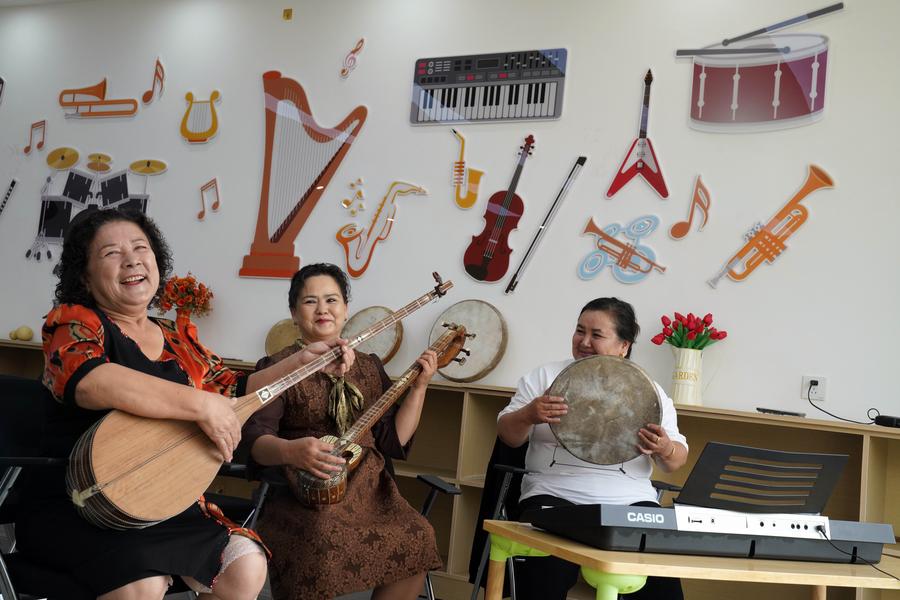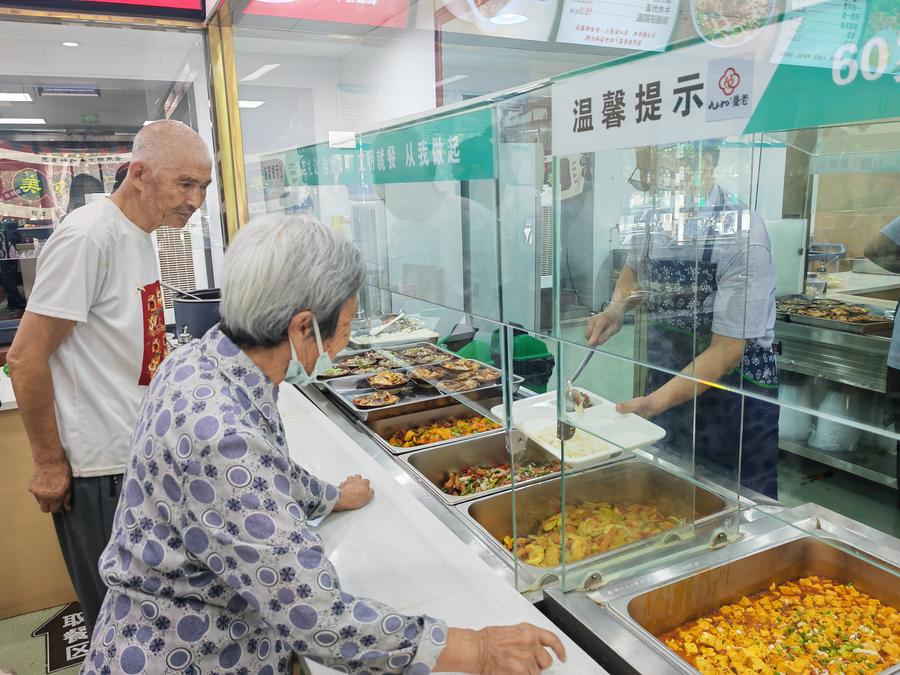Aging at home with independence, safety and peace of mind

Residents play traditional instruments at a music studio of the Donghu residential community in Kashgar, northwest China's Xinjiang Uygur Autonomous Region, Sept. 22, 2024. (Xinhua/Zhao Yusi)
BEIJING, Nov. 6 (Xinhua) -- A 24-hour emergency response system has allowed 91-year-old Chen to feel safe at anytime of the day, living alone in Shanghai.
The new system provides Chen, who chose to be referred to by surname, with around-the-clock care and peace of mind, as she knows that help is just a phone call away. "It's such a relief," her son said.
There were 297 million people aged 60 or above in China at the end of 2023, accounting for 21.1 percent of the country's total population. And more than 90 percent of this elderly population would prefer to grow old at home, a poll has shown.
Integrated in-home and community care is likely to be the dominant model elderly people in China will choose for their golden years over the next one to two decades, said Lei Xiaoyan, a professor of economics at Peking University's National School of Development, citing both demand and financial realities.
In response to this trend, Wuliqiao, where Chen lives, has established a 24-hour emergency response center as well as a quick response point in each of the three city blocks of the sub-district, which is an administrative unit equivalent to a township.
In addition to managing emergencies like injuries, falls and burns, the system also provides daily living assistance, including personal care after incontinence, and people to accompany seniors to medical appointments when needed. Including Chen, 176 residents have signed up for the service.
In Panjin, a city in northeast China's Liaoning Province, Li Qinghe's home now features accessibility rails, an adjustable backrest support and a wooden chair designed for seniors. Across town, 86-year-old Wu Huanlai has received a wheelchair, a four-leg cane and a shoe bench.
Both are beneficiaries of minimum subsistence allowances. The Chinese government is working to support its most vulnerable citizens, experts say.
Authorities in Liaoning, for example, allocated a sum of 30 million yuan (about 4.22 million U.S. dollars) in 2023 -- and again in 2024 -- to assist elderly individuals who face difficulties with home renovations, focusing on bathroom safety, indoor mobility features, smart monitoring and support equipment.
By the end of 2023, 27,000 homes of elderly people in the province had been remodeled, with an additional 15,000 households expected to be upgraded by the end of this year.
STEPPING OUT OF HOME
Li Xiurong, 77, said that the installation of an elevator in her apartment building has transformed her life in ways she had long dreamed of.
She had yearned for the freedom to take her grandson downstairs for leisurely walks and grocery trips, she said, without fearing a fall on wet steps or the exhaustion of the summer heat when tackling the eight flights of stairs leading to her home in the Longcheng sub-district of Shenzhen, which is located in south China's Guangdong Province.
"I have to take a break after climbing each flight of stairs because my back and knees hurt so badly. So I tried to make do at home and avoided going downstairs whenever possible," she said.
With the recent installation of 395 elevators in Longcheng, over 30,000 people living on the upper floors of apartment buildings no longer need to struggle to go outside.
An accessible environment is essential for elderly individuals to participate fully and conveniently in social life, experts say. China enacted its first law on barrier-free environments in September 2023, making specific stipulations for the installation of elevators in older communities.

Senior residents order a meal at Qingshuiwan community canteen in Yinchuan, northwest China's Ningxia Hui Autonomous Region, Aug. 1, 2024. (Xinhua/Zou Xinyuan)
DINING & SOCIAL LIFE
In the early morning light, 87-year-old Zhang Ling recently made her way to her community's elderly care center in Huichun, a city in northeast China's Jilin Province, for a rejuvenating massage.
And as she was soothed into relaxation, her 89-year-old husband, Yu Chenghai, played Chinese chess in an adjacent room, bursts of hearty laughter echoing through the walls.
"The dining hall here is convenient and offers great prices for us," Zhang said. "The community even brings health check-ups right to our doorsteps. I couldn't be more content with life."
In 2023 alone, provincial authorities invested 100 million yuan to establish 102 elderly care centers and 100 dining halls at communities across Jilin.
And by the end of June 2024, there were 410,000 elderly care institutions and facilities across the country. These included 369,000 community-based ones, which was 120 percent up from the number reported in 2019, according to official data.
Photos
Related Stories
- In pics: 2024 Shenzhen International Intelligent Elderly Care Industry Expo
- China expands elderly care services with focus on community-based solutions
- Customers visit elderly product mall in Shenzhen
- Morning brew with memories: Dementia-friendly cafe gets seniors engaged
- Senior canteens fill stomachs and hearts of China's elderly
Copyright © 2024 People's Daily Online. All Rights Reserved.









